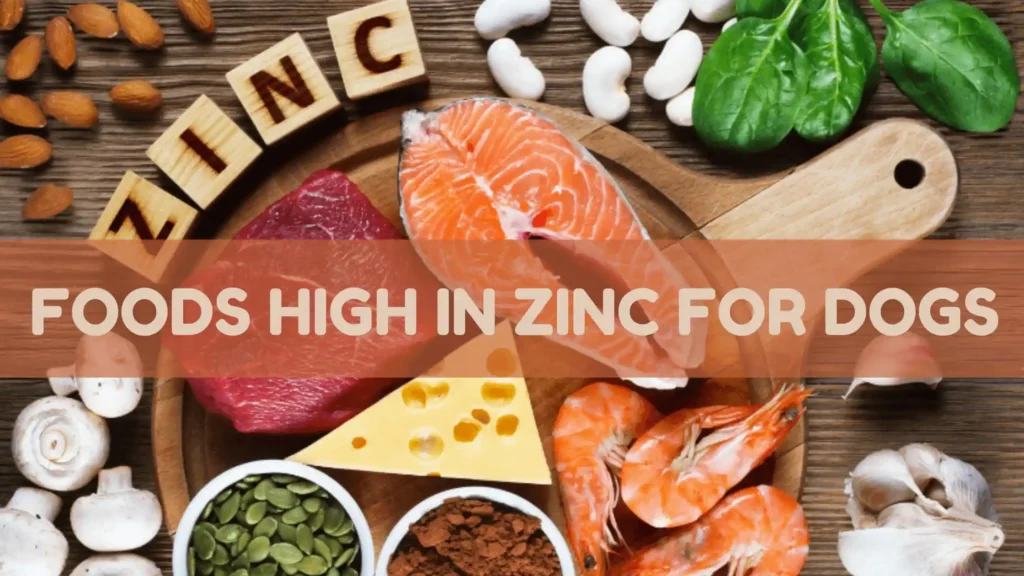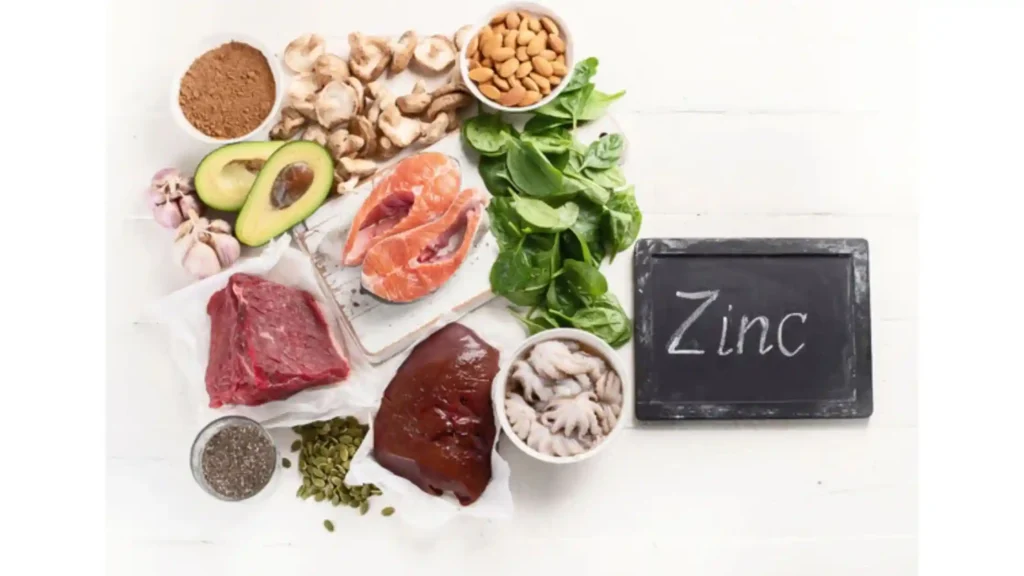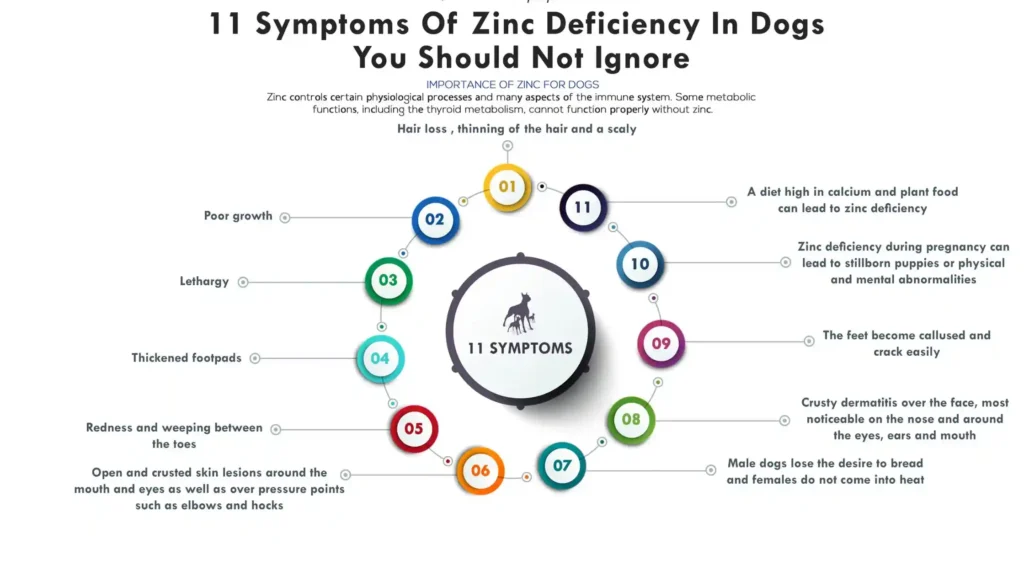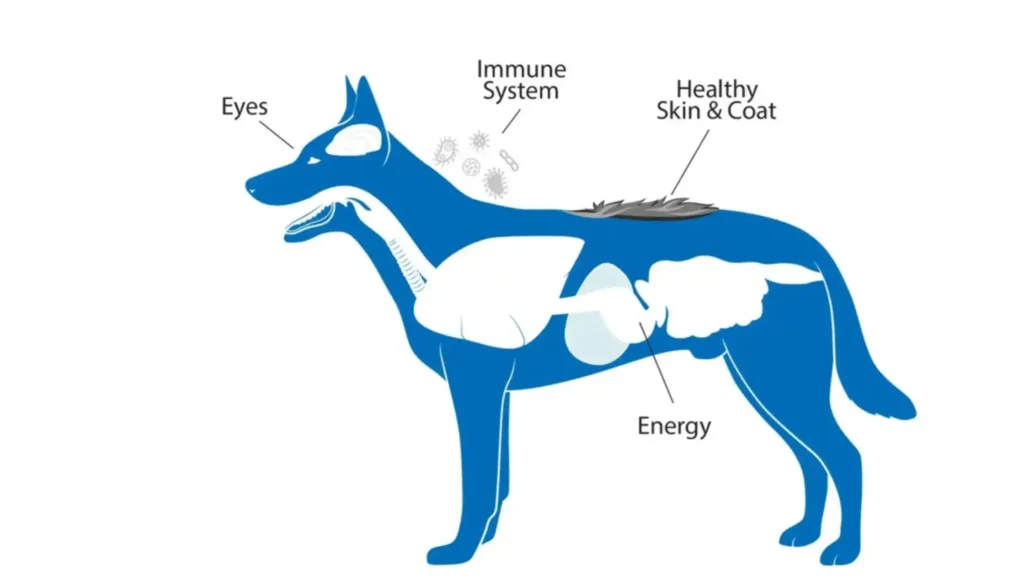Best Foods High in Zinc for Dogs to Boost Your Dog’s Health
Being a good and caring pet parent, you’re trying to stay on top of your dog’s health. Zinc is one of many overlooked nutrients. For all of these important functions, this is a major mineral.

I want to get into the best foods high in zinc for dogs, how much they do in fact need, and how you can be sure you’re giving your dog’s diet what it needs to stay as healthy as possible.
Why Zinc is Important for Dogs?
Foods High in Zinc for Dogs is essential for a number of bodily functions: enzyme activation, immune support, and skin repair, among others. Low zinc in dogs can lead to a variety of health problems from skin to immune system issues.
Foods High in Zinc for Dogs
High-zinc Meats and Poultry
Lean meats, such as beef, lamb, and pork, are all rich in zinc. These are very helpful for supplementing a dog’s zinc intake including them in a balanced portion with your dog.
Fish and Seafood Options
Salmon and sardines are also packed with zinc, plus beneficial omega-3 fatty acids that also help skin and coat health.
Zinc-Rich Foods for Dog Health

Whole Grains
Oats, quinoa, and brown rice have moderate levels of zinc and are good for supplementing your meat sources for a balanced diet.
Vegetables and Legumes
Vegetables like spinach, peas, and chickpeas give a small but useful amount of zinc for the dog’s food and your dog can benefit from it.
Top Zinc Supplements for Dogs
Zinc Gluconate vs. Zinc Sulfate
Like other forms of zinc, zinc gluconate is more bioavailable for dogs with sensitive stomachs. However, others find that zinc sulfate can be effective too, although it may cause digestive upset in some dogs.
How to Choose the Right Supplement for Dogs
Never put anything in your dog’s food without asking your veterinarian first. And so they can tell you which kind and dosage is ideal based on your dog’s size and state of health.
Natural Zinc for Dog’s Diet
Using supplements exclusively to reach adequate intake is not a good idea and is much more risky than using high-quality dog foods with some types of natural sources of zinc.
Zinc Deficiency in Dogs – Signs and Solutions

Hair loss, crusty skin, slow healing wounds, and in some cases compromised immune system are symptoms of zinc deficiency. As with the majority of cases, the solution is usually to change the diet, using Foods High in Zinc for Dogs supplements if needed.
Can Dogs Eat Zinc-Rich Meats?
It’s true, as long as dogs’ meals of Foods High in Zinc for Dogs meats are well cooked and given in moderate amounts, they can eat well. Many dog foods use meats as their primary source of zinc.
Benefits of Zinc for Canine Immunity
One beneficial effect of zinc is to support white blood cell production and therefore help your dog’s body fight the elements better at fighting infections.
Adding Zinc to Homemade Dog Food
If you’re making your dog’s meals from home, meat and whole grains that are Foods High in Zinc for Dogs would help provide the nutrition they need.
Essential Minerals for Dog’s Skin and Coat
Zinc is only one of the minerals that keeps your dog’s skin and coat healthy. It also helps protect flaky skin and dull fur in conjunction with copper and omega-3 fatty acids.
How Much Zinc Do Dogs Need?
Foods High in Zinc for Dogs, Zinc is necessary for dogs, they require about 20 mg of zinc per kilogram of body weight daily. This, of course, changes with age, level of activity, and overall health, but it’s always best to check with your vet.
Safe Zinc Supplements for Dogs with Allergies
If your dog is allergic to any food, look for hypoallergenic zinc supplements. A form of zinc that’s gentler on your dog’s digestive system may be zinc-picolinate.
Boosting Dog’s Immune System with Zinc

Enzymes essential to immune cell production are activated by zinc so that your dog remains healthy and can fight off disease.
Balancing Zinc in a Dog’s Diet
A balanced approach is key. However, because over supplementation can be toxic it’s important to stick to recommended levels for multivitamin usage and opt for whole food sources as much as possible.
Zinc in Raw Dog Food Diets
Since raw diet enthusiasts tend to include raw meats and bones from high-zinc animals such as lamb, this can also serve you to get enough zinc in a natural way for your dog.
Healthy Dog Treats High in Zinc
Treats made with liver, beef, or lamb are some tasty and zinc-boosting rewards to consider. Zinc-rich treats are also available on many commercial treats, so check the label to find some.
Veterinarian-Recommended Zinc Sources for Dogs
Zinc-rich dog food or zinc gluconate supplements are recommended by vets for dogs that need an immune or skin health boost.
Zinc Toxicity in Dogs – What to Avoid
Zinc toxicity can occur from too much of it, and symptoms may include vomiting, lethargy, and, in the worst case, kidney damage. Don’t feed dogs items that have high levels of zinc, such as some nuts, which can be toxic.
Zinc and Joint Health for Dogs
By way of healing connective tissue, zinc is helpful for joint health. Older dogs or dogs susceptible to arthritis can really benefit from this.
Conclusion
Zinc is a biggie of a mineral that gives your dog’s health a boost in areas such as skincare and immune support. If you want to ensure that your dog is getting a balanced intake of zinc through food and your dog may need supplementation, you’ll want to pay attention to this. At any given time there is no need to have a zinc plan that is always the same. It’s best to consult your vet to see what is appropriate for your pup’s individual needs.
Frequently Asked Questions
How can I increase zinc in my dog’s diet?
A better known – and important – form of this mineral is zinc which is essential for skin health, immune system function, vision, cell growth and replication, as well as sexual function in breeding dogs (Martens, 1998). Dogs, like us, don’t produce zinc naturally — it has to come from the food that they eat, including fresh red and white meat, fish, and root vegetables.
What is the best form of zinc for dogs?
For that reason, commercial pet food contains zinc as it is often supplemented but studies have shown that zinc methionine and zinc propionate are more bioavailable than zinc oxide or zinc sulfate. It’s the short answer: the freshest food is the best source of bioavailable nutrients!
What are the signs of zinc deficiency in dogs?
Zinc deficiency in puppies causes stunted growth, diarrhea, crusted, cracked footpads, and multiple infections.
What are the best animal sources of zinc?
But beef is eaten a lot, contributing 20 percent of US food zinc intake due to its common ingestion, and so although oysters have the most per serving, beef provides 20 percent of our food zinc intake. Zinc is found in eggs and in dairy products.
What dog breeds are prone to zinc deficiency?
Northern breeds, such as Huskies and Malamutes, have a genetic zinc deficiency. Big breeds like Great Danes, and St Bernard, are more commonly seen. Common also are large breed dogs such as German Shepherd Dogs and Dobermans.
What happens if a dog has too much zinc?
However, pets with more serious pet poisoning may have damage to the liver, kidneys, heart, or pancreas. They may also drink more, urinate more, lose weight, have abdominal pain, or grow larger organs. Rarely, neurologic signs of incoordination and seizures may occur.
